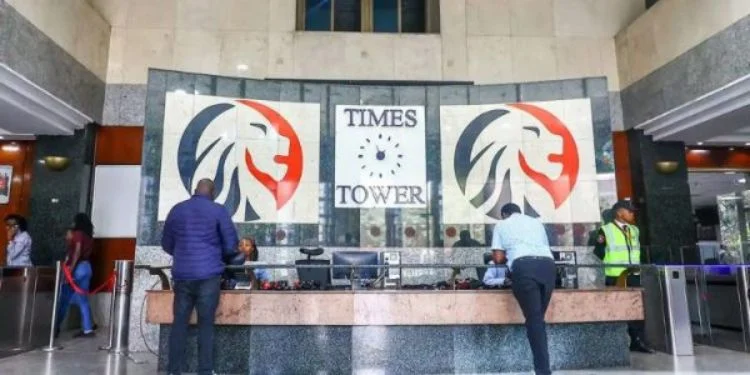NAIROBI, Kenya – Today, Kenya witnessed widespread protests on Wednesday as citizens voiced their frustration over the soaring cost of living, directly attributed to a depreciating Kenyan shilling and increased taxation imposed by the Finance Bill 2023. The relentless decline of the shilling has had a severe impact on imports, exacerbating the financial burdens faced by households across the country.
The local currency, according to Central Bank of Kenya (CBK) data, weakened further to an alarming low of 141.216 shillings against the US dollar. Since the start of the year, the shilling has shed over 13 percent of its value from its January average of 124.49 against the dollar.
Analysts predict that the shilling could plummet further and reach 145 against the dollar by the end of August, primarily driven by high US Federal Reserve rates. The anticipated interest rate hike, expected to range between 5.25 percent and 5.5 percent later this month, is a significant contributing factor. The US Fed has employed rate hikes as part of its strategy to combat high inflation.
The Kenyan shilling has been on a downward trajectory since mid-2018, when it stood at 101.29, despite the CBK’s assurance of currency stability. This continuous decline has adversely affected local traders and manufacturers, who are now grappling with the escalating costs of securing dollars for international trade payments. These additional expenses are often passed on to consumers, further burdening households already struggling with the high cost of living.
The Kenya Association of Manufacturers (KAM) underscores that local industries have no alternative but to pass on the extra costs to retailers and, ultimately, to consumers themselves.
As the shilling weakens, the impact extends beyond imports, affecting petroleum products, transportation, farm production, manufacturing, and electricity prices. Higher forex levies on power bills, attributed to foreign exchange fluctuation adjustment charges, are being passed on to consumers. This increase, coupled with the rising costs of food products such as cooking oil, wheat, maize, and other imports, adds immense pressure to households already grappling with historic prices of sugar and exorbitant costs of other food commodities.
Abraham Rugo, Country Manager at the International Budget Partnership, believes that the current policy stance is to allow the shilling to find its equilibrium through market forces.
Last month, the country experienced a slight easing of inflation to 7.9 percent due to cheaper food prices, primarily vegetables. Increases in prices within food and non-alcoholic beverages, housing, water, electricity, gas, and transportation were the key contributors to inflation, collectively accounting for over 57 percent of the weighted categories, according to Macdonald Obudho, the Director-General of the Kenya National Bureau of Statistics (KNBS).
The ongoing protests highlight the mounting frustration among Kenyan citizens as they contend with the compounding effects of a depreciating shilling, increased taxation, and a challenging cost of living. Policymakers and authorities must address these concerns urgently to alleviate the hardships faced by households across the country and restore economic stability.
By: Montel Kamau
Serrari Financial Analyst
12th July, 2023
photo source: Google
Article, Financial and News Disclaimer
The Value of a Financial Advisor
While this article offers valuable insights, it is essential to recognize that personal finance can be highly complex and unique to each individual. A financial advisor provides professional expertise and personalized guidance to help you make well-informed decisions tailored to your specific circumstances and goals.
Beyond offering knowledge, a financial advisor serves as a trusted partner to help you stay disciplined, avoid common pitfalls, and remain focused on your long-term objectives. Their perspective and experience can complement your own efforts, enhancing your financial well-being and ensuring a more confident approach to managing your finances.
Disclaimer: This article is for informational purposes only and does not constitute financial advice. Readers are encouraged to consult a licensed financial advisor to obtain guidance specific to their financial situation.
Article and News Disclaimer
The information provided on www.serrarigroup.com is for general informational purposes only. While we strive to keep the information up to date and accurate, we make no representations or warranties of any kind, express or implied, about the completeness, accuracy, reliability, suitability, or availability with respect to the website or the information, products, services, or related graphics contained on the website for any purpose. Any reliance you place on such information is therefore strictly at your own risk.
www.serrarigroup.com is not responsible for any errors or omissions, or for the results obtained from the use of this information. All information on the website is provided on an as-is basis, with no guarantee of completeness, accuracy, timeliness, or of the results obtained from the use of this information, and without warranty of any kind, express or implied, including but not limited to warranties of performance, merchantability, and fitness for a particular purpose.
In no event will www.serrarigroup.com be liable to you or anyone else for any decision made or action taken in reliance on the information provided on the website or for any consequential, special, or similar damages, even if advised of the possibility of such damages.
The articles, news, and information presented on www.serrarigroup.com reflect the opinions of the respective authors and contributors and do not necessarily represent the views of the website or its management. Any views or opinions expressed are solely those of the individual authors and do not represent the website's views or opinions as a whole.
The content on www.serrarigroup.com may include links to external websites, which are provided for convenience and informational purposes only. We have no control over the nature, content, and availability of those sites. The inclusion of any links does not necessarily imply a recommendation or endorsement of the views expressed within them.
Every effort is made to keep the website up and running smoothly. However, www.serrarigroup.com takes no responsibility for, and will not be liable for, the website being temporarily unavailable due to technical issues beyond our control.
Please note that laws, regulations, and information can change rapidly, and we advise you to conduct further research and seek professional advice when necessary.
By using www.serrarigroup.com, you agree to this disclaimer and its terms. If you do not agree with this disclaimer, please do not use the website.
www.serrarigroup.com, reserves the right to update, modify, or remove any part of this disclaimer without prior notice. It is your responsibility to review this disclaimer periodically for changes.
Serrari Group 2025
















